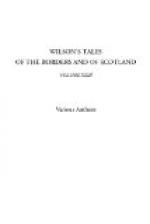“Shortly after I had joined my regiment,” continued Charles, “I was present in Devonshire, at what is called a revel. Our mess gave a purse towards the games. We put forward a Cumberland man belonging to the regiment, in the full confidence that he would be the victor of the day; but a youth, a mere youth, threw not only our champion, but all who dared to oppose him. I was stung for the honour of Cumberland; I was loath to see the hero carry his laurels so easily from the field. I accoutred myself in the wrestler’s garb; I entered the ring. The shouting of the multitude ceased instantaneously. I gazed upon my antagonist, he gazed upon me. Our hands fell; we both shook; we were the image of each other. Three years afterwards I was in Holland. A soldier was unjustly condemned to die; I saved him; I obtained his pardon. He was my strange counterpart whom I met in Devonshire. He had the mark of the rose-bud beneath his chin that I have, and which you say my brother has.”
“And where is he now?” eagerly inquired the colonel.
“Alas! I know not,” answered Charles; “nor do I think he lives. Three days after I had rescued him from unmerited death, I learned that he had fallen bravely on the field; and whether he be now a prisoner or with the dead, I cannot tell.”
“Surely it was thy brother,” said the colonel; “yet how he should be in Devonshire, or a soldier in the ranks, puzzles me to think. No, no, Charles, it cannot be; it is a coincidence, heightened by imagination. Your grandfather has not been kind to me, but he is not capable of the cruelty which the tale you have told would imply he had exercised towards the child I entrusted to his care. He hates me, but surely he could not be cruel to my offspring. You know Morris House?” he added.
“I know it well,” replied Charles; “but I never knew in it one who could be my brother, nor one of my age; neither did I know Mr. Morris to be my grandfather; nor yet have I heard of him but as one who had injured my mother while she lived, and who had been the enemy of her parents.”
“Enough, enough, my son,” said the colonel; “my soul is filled with words which I cannot utter. I weep for your angel-mother; I weep for my son, your brother; and I mourn for the unceasing hatred that exists between your grandsires. But, Charles, we must return to England; we must do so instantly. I have now fortune enough for you and for your brother also, if he yet live, and if we can find him. But we must inquire after and go in quest of him.”
Within three months Charles Morris, or Lieutenant Sim as he has hitherto been called, and his father returned to England together. But instead of following them, I shall return to George Prescot, the prize-wrestler and the condemned and pardoned soldier. It has been mentioned that he was wounded and left upon the field by a retreating army. I have to add that he was made prisoner, and when his wounds were healed, he was, though not perceptibly, disabled for active service. Amongst his brethren in captivity was a Captain Paling, who, when an exchange of prisoners took place, hastened to join his regiment, and gave George, who was deemed unfit for service, a letter to his mother and sisters who resided in Dartmouth. The letter was all that the captain could give him, for he was penniless as George was himself.




